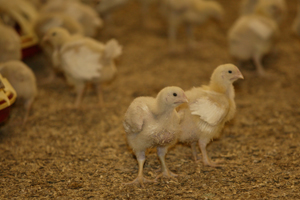Reducing ammonia through direct-fed microbials

Ammonia volatilisation from poultry litter often leads to a high concentration of atmospheric ammonia that negatively impacts bird performance, increases susceptibility to respiratory diseases in poultry, and is also harmful to farm workers and the environment.
Litter amendments for reducing ammonia volatilisation, such as aluminum sulfate treatment, can only be applied when the house is empty, reducing their effectiveness and increasing down time of the house.
Direct-fed microbials (DFM) are naturally occurring beneficial microorganisms shown to have positive effects on animal health and performance when given in appropriate quantities. DFMs have been shown to improve overall bird gut health and performance, reduce incidences or food safety associated pathogens and necrotic enteritis, and can be easily and continuously administered via feed.
In this research a Bacillus spore-based DFM (Sporulin) was shown to reduce ammonia volatilisation from faeces of treated birds.
Broiler chicks were raised in isolator units and fed a diet containing 106 spores/g for two weeks, after which the faeces was collected and analysed for ammonia volatilisation, spore concentration, and water content. Faeces from the treatment group were found to have a >75% reduction in total ammonia volatilisation over a 48 hour time period as compared to the control group. The faecal water content of the treatment group was reduced 30% as compared to the control group, likely explaining part of the reduction in ammonia volatilisation.
A 3 log increase in faecal spore concentration was also seen in the treatment group possibly contributing to the lower ammonia emissions. This research indicates that some DFM, can provide a potent and continuously administered method of controlling ammonia volatilisation in poultry litter.
Source: Jacob Lum, Matthew Faulkner, Jose Vicente, Ross Wolfenden, Pacific Vet Group, Fayetteville, AR USA
Abstracts of the 2014 International Poultry Scientific Forum, Atlanta, GA USA













